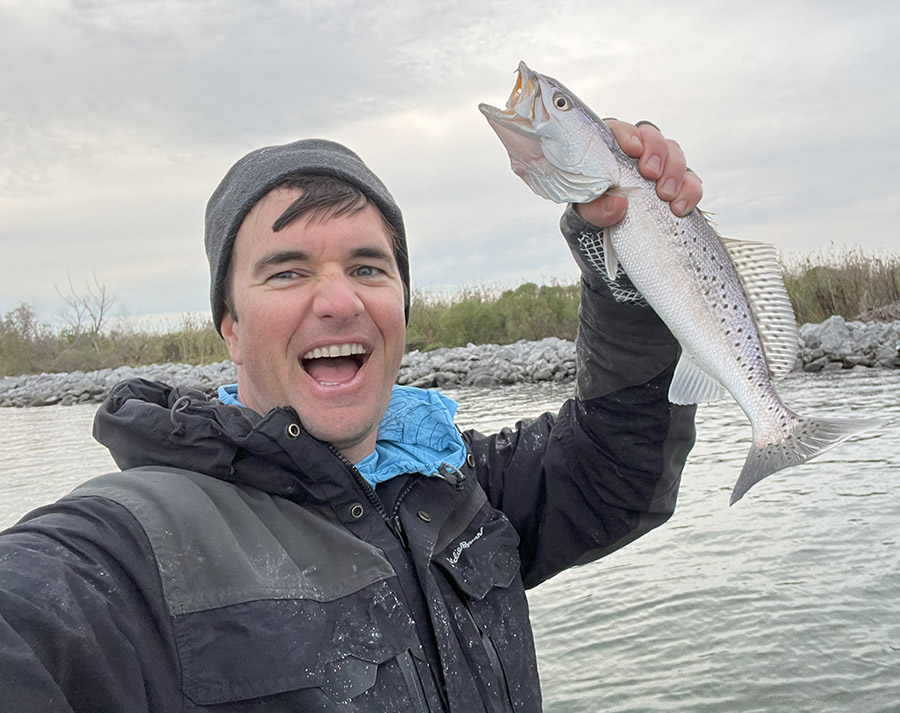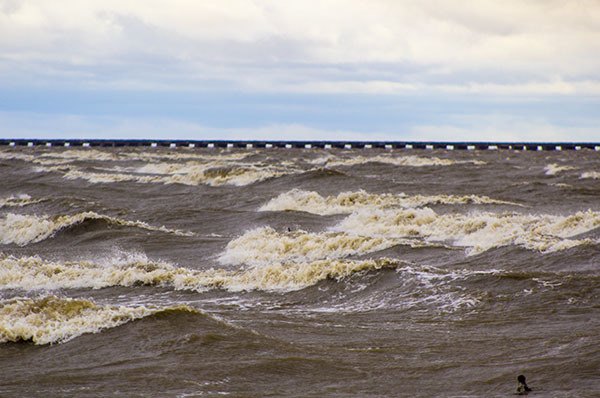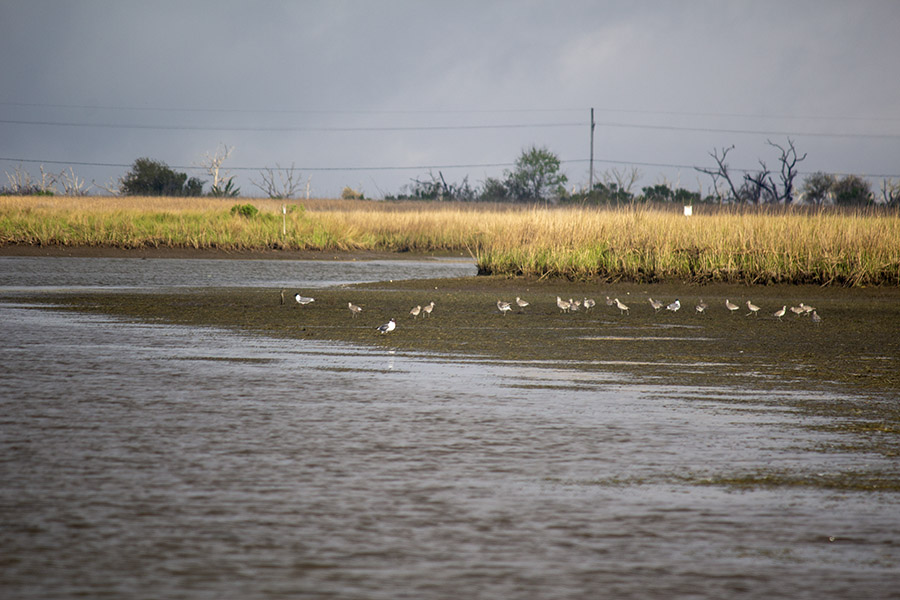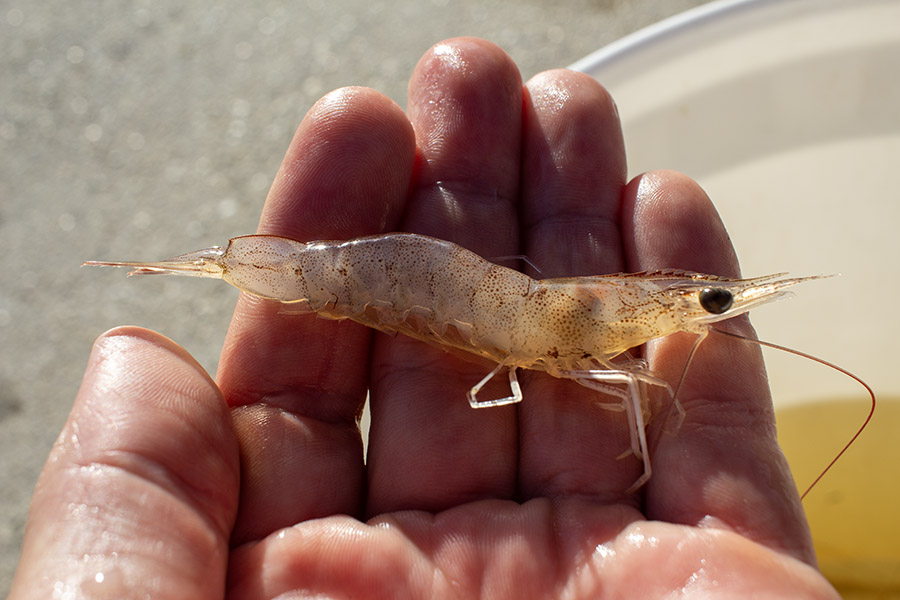Speckled trout seek deep water for a variety of reasons, and this guide sheds light on those in order to help you better understand your quarry.
What you discover here applies during every season of the year, but there is an emphasis on fishing deep holes during the coldest of winter.
Let's jump into this by asking this important question:
Why is it important to know why speckled trout seek deep water?
The answer is simple: If you know how a fish (in this case, speckled trout) will react to a set of conditions, then you know where to navigate your boat, what tackle to use, and when to be there.
I've got some ideas on this, but there are two things you should know before we dive into them:
- I am not a marine biologist. What I am sharing is what I've learned on the water over many years of targeting speckled trout.
- If you have anything you want to add, then please do so in the comments below.
Theory #1: Stable Temperature
If you have ever been diving then you know the deeper you go the more cold water becomes. It may not be gradual but could be sudden in the form of a thermocline.
Initially, it doesn’t make sense for speckled trout to seek deep water (because it is colder) when they are simply trying to survive during winter months, but consider how much more fluid air is than water.
Cold air can move in at the blink of an eye and make us reach for a jacket. But water doesn't change temperature as fast. Yes, a few degrees is a big difference for a fish, but they can't reach for warming layers, either.

Catching speckled trout in deep holes is a lot easier when you know why they are going there to begin with.
With trout, it’s not really so much the cold temperature that could kill them, but a rapid change in temperature. At the bottom of these deep holes lies water unaffected by drastic temperature changes or, at the bare minimum, it is affected the least.
This water is “safe” because it is stable. Think of deep water (or "deep holes") as a “bunker” that speckled trout can seek refuge in whenever bad weather strikes.

Deep holes are less affected by harsh surface conditions than shallower water is.
This goes the same way during summer, when it is heat and not cold that can make speckled trout seek deep water and avoid becoming lethargic or worse.
Deep water offers them a place to get away from the warming effect the sun has on shallow water. I have found this to be the case, unless there is overcast weather to keep a bite going.
A deep water fallacy?
I have heard anglers use the explanation that trout seek deep holes because the ground at the bottom keeps them warm.
Essentially, the trout are attracted to the geothermal radiation of the earth and that is why speckled trout seek deep water.
I respectfully disagree with this.
Consider this idea: There is ground at the bottom of shallow water, too. Does that earth not warm that water as well?

When water gets low, fish are forced out of shallow bodies of water into the deeper ones. The best deep holes offer protection from changing conditions at the surface.
Additional Consideration: The Mighty Mississippi
Something else to consider is that the Mississippi River is much more stable in temperature than the marsh surrounding it.
This is because water is constantly flowing from up north, where the air temperature tends to be cooler and more consistent than what we experience here on the Gulf Coast.
Even though it tends to run cooler — by as much as 10 degrees or more — we still see a slew of speckled trout in it, especially when she is low, like what we have seen so far during The Saltening.
Just look at these charts comparing Grand Isle to Pilottown (near Venice in the Mississippi River) during July 2023 and December 2022.
Grand Isle vs Pilottown July 2023


Which looks more stable and consistent to you? Now let's look at December 2022, when we had a good cold front or two blow across Louisiana's coast, cooling it off significantly:
Grand Isle vs Pilottown December 2023


I strongly feel that is because the river cannot warm up like the marsh does. If it cannot get warm, then it cannot have a rapid drop in water temperature, the kind that would make speckled trout seek deep water.
The fall and winter action in the Mississippi River, from Buras to Venice, stood head and shoulders above anywhere else on Louisiana's coast from 2021 to 2023, the years immediately following the Freshening.
A trout's metabolism changes with body temperature, which matches the surrounding water temperature.
And fish body temperature can vary as much as 40 degrees! If that happened to us, we would die.
But fish don’t.
They don’t die because they can adapt by changing their body’s chemical processes.
And this adaptation requires a “time out” to adjust.
This time out is facilitated by inhabiting the stability that deep water offers.
Theory #2: Stable Salinity
Saltwater is denser than freshwater, causing freshwater to float on top.
Now let's take it one step further: some saltwater is saltier than other saltwater, and the saltiest of saltwater will be pulled to the bottom by gravity.
How is this relevant? Well, very much in the same way speckled trout like stable water temperature.
It's a reasonable assumption that deeper water will have salinity that doesn't change as much as shallower water, especially in areas exposed to freshwater input.
Salinity Is Not As Important As You Have Been Led To Believe
Let's not conflate the above with speckled trout needing salty water all the time.
In fact, you'd be surprised at the salinity you have caught speckled trout in. Very rarely is it anything resembling full-strength ocean water, which is about 35 parts per thousand (ppt).
During the summer pattern they need water that is at least 15 to 17ppt in order to spawn.
During winter we catch limits of speckled trout in salinity that hovers much closer to zero than it does that of sea water, or about 2 to 4 parts per thousand.
If you're not sure, just check out Hydrocoast Maps and compare where you catch fish to what you see on the map.
Theory #3: Security Needs Make Speckled Trout Seek Deep Water
I cannot be certain this is a factor or not, but it is something I have contemplated, and maybe you have, too.
While speckled trout are somewhat apex predators, they are still easy meals for animals higher in the food chain, such as dolphins, sharks and bull reds.
Consider that lures we use are being “skylined” when viewed from the bottom of the water column, making them easy targets.
Their silhouettes give away their position and leave them vulnerable. It is easily understood why trout want to avoid putting themselves in this predicament.
When trout hold to the bottom of a deep hole, there is no way they can be skylined.
Additionally, it's less likely they can be had by an osprey or pelican if they seek deep water.
Theory #4: Hydrodynamic Efficiency
It would also seem to me that it would be easier to hold in one place if water isn’t flowing around one side of the trout body, but I could be wrong.
This is a guess on my part, but I know that when I go diving that holding to the bottom is easier than being fully exposed to the current.
So it makes sense that speckled trout seek deep water and cling to the bottom in order to burn less energy, especially during the extremes of winter and summer.
Theory #5: New Feeding Opportunities
Consider that bait fish are seeking out these deep holes for the same reasons speckled trout do, while some are already living there.
These tend to be demersal finfish such as croakers, violet gobies, cocahoes and more.
So, whether speckled trout are escaping changing conditions or not, there are certainly new feeding opportunities for them in deep holes that they can turn to if and when other types of forage run out.
A good example is when the fall white shrimp run is over.

When these run out, speckled trout seek deep water for new feeding opportunities.
Putting It All Together
Now that you have some working theories as to why speckled trout seek deep water, maybe you are already thinking where you can begin fishing deep holes.
Which leads us to this next question: Where can we find deep water (or deep "holes") to catch speckled trout?
This next guide about finding deep holes for speckled trout explores the answers to that question and gives you some tools to work with to locate these fishing hot spots!
Or you can get it all inside my course Inshore Fishing 101, do what's best for you.
Why do you think speckled trout seek deep water?
You've already read my ideas about speckled trout and deep water, so what about yours?
I enjoy seeing people consuming the content created here, and a great way to do that is by leaving a comment.
If you have something to add, or simply a relatable fishing experience, then please post it in the comments below!

This is brilliant. Man, I wish more people took time to be this thoughtful. That really would motivate the hell out of me. Usually it’s, “hey where were u fishing in that youtube video?”
Ugh. Shoot me.
Everything you said makes sense and it contributes to this guide, especially for those handful of souls willing to read the entire thing and make their way to the comments at the very bottom.
Thank you so much!
As a hydraulic engineer I have a few other bits of info that support your conclusions: in any fluid flow situation there is an energy loss in the form of friction with whatever surface that fluid is flowing across. The amount varies due to a wide array of parameters but there’s no need to define them here as we aren’t calculating anything and for the most part they align with common sense. This friction creates what is called a “boundary layer” between the surface and the main body of the flowing fluid. For our purposes it’s sufficient to understand that for flow in an open channel that is predominantly non turbulent the fluid velocity approaches 0 at the bottom and increases as depth decreases. The deeper the channel the more gradual the change occurs.
When you couple this with the fact that compared to air flow of the same velocity and temp, water absorbs approx 25x more heat than does air, and you start to understand why a trout trying to reduce the rate at which it’s body cools as water temps fall needs to hug the bottom. Especially considering the high winds and dramatic tide fluctuations that commonly accompany cold fronts. Think about the last time you were exposed to a freezing wind, and how much relief you felt when you found shelter from said wind, even though the air temp didn’t change… Now factor that difference by 25 and you have an idea of the devastating effect that the combination of velocity and cold could easily have on a trout, why exact temp is less important than velocity and why a trout would seek out areas where it can always count on finding stable areas of low velocity.
One other thing I’ll briefly mention about fish behavior during temp drops I believe most people don’t factor in is this: when water temps fall it affects small fish MUCH more rapidly than larger ones. I commonly see reds take advantage of this by charging onto the flats right after dark on evenings with a sharp cooling trend. A ten lb redfish has a considerably longer window in which it can maintain peak functionality in that circumstance than say… A 3 oz bait fish. It’s similar though much less severe and of shorter duration to the unfair advantage dolphins have over fish in cold water.
Regards,
Derek Debowski
yes they work in VA waters, you should definitely apply what you see here in Virginia
Yeah, that makes sense. This is a great comment, it adds to the value of this blog post. Thank you for posting it!
Captain Devin,
Engineer (and LAFB Elite member here) – Your hydrodynamic efficiency hypothesis is scientifically correct. The study of fluid mechanics tells us that no matter how fast a fluid may be moving, its velocity at a boundary (such as the bottom of a lake, bay, or bayou – or the very inside edge of a pipe in your house) is zero. (“At a boundary” refers to the very last molecule of water from the bottom, so a speckled trout doesn’t experience ZERO current velocity at the bottom, but by staying close to the bottom, they do have very little current to contend with and can conserve energy, exactly as you said…)
Hey Ronald, thanks for commenting. I have no experience fishing Virginia and can’t give you a definitive answer. However, speckled trout are speckled trout and I think you’d serve yourself well to take what you can from here and test that knowledge on your own waters.
Good luck out there, and tight lines!
Can your tips be used in va waters or do I have to do something different up here
I’m glad you concur. Thanks for commenting, Chris!
You are absolutely correct that a fish in moving water can use less energy by staying on the bottom. The reason is because the current speed next to the bottom is up to 90% less than the fastest portion of that current. This is called. ‘Laminar Flow’ within the field of Hydrology.